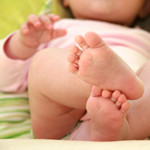What can I do about my toddler’s constipation?
Constipation is quite common and will probably happen a few times as your little one grows up. It can be caused by several things such as:
not eating enough fibre
not drinking enough fluids
drinking too much milk and not enough water
lack of exercise and activity
Psychological factors can also play a role. If you have been very harsh on your child while potty training every time she has an accident, she may be afraid to pass stool and may hold it in. If she has started school, she may be embarrassed or uncomfortable to go to the toilet at school and hold back the need to go until she is home. Holding in the stool for too long can lead to constipation.
If your child is constipated, it may be painful for her to do potty. This means that your child might hold back even more and a vicious cycle begins. If she is very constipated, she may lose the urge to do potty altogether.
If your baby has not passed stool for more than 24 hours, or if she cries while passing stool or has got slight cuts to her anus from passing hard stool, take her to see the doctor. He might prescribe some laxatives that are suitable for your child. In the meantime, there are several things you can do at home to ease the constipation and prevent it from reoccuring:
Give her food rich in fibre: Give your child plenty of fruits like figs, apricots and plums. Dates and prunes are also considered good for constipation. They can be mashed into porridge (dalia) or custard or can be disguised as part of a fruit salad if necessary. Also, eating whole fruit like apples or pears with the peel or munching on carrots and cucumbers will make it easier for your child to do potty. The peel acts as roughage and helps things move along the digestive tract. Vegetables, like gourd (lauki or ghia), peas, sweetcorn, spinach (palak), fenugreek (methi) and mustard greens (sarson saag) are good for constipation. Wholegrain cereals like whole-wheat dalia and multi grain chapattis contain a lot of fibre and so will provide the needed roughage. But it is important to balance these with fruits and vegetables or you may not get the desired effect. Bran-based foods may prevent important minerals from being absorbed.
Give her plenty of fluids: If your toddler isn't getting enough liquids, her system will respond by absorbing more fluid from whatever she eats or drinks - and from the waste in her bowels, as well. This can result in hard, dry bowel movements that are difficult to pass. Water is the best option for her, although you can offer well-diluted fruit juice too (at least one part juice to 10 parts water). Coconut water and buttermilk (chaach) are other healthy options you may want to include.
Try home remedies: Many parents give their children a dash of ginger juice with half a teaspoon of honey every night to ward off constipation. But honey may be unsafe for babies less than a year-old. It's always a good idea to have a word with your child's doctor before trying out any herbal remedies. Some of these remedies may contain ingredients which may not be suitable for young children.
Set a routine for using the potty seat: If your child gets used to passing stool at roughly the same time every day, her bowel movements might become more regular. Have your child sit on the potty seat for ten minutes at the same time every day and gradually she will learn to do potty at that time. Find a time that suits you, when you can be patient with her and let her take her time. You can keep her on the potty by distracting her with songs, books or anything that she will happily do for a few minutes without wanting to get up.
Let her get enough physical activity. Movement and active play helps blood flow to your child's digestive system, and helps the bowel muscles move things along. So if your child is spending more time sitting reading, drawing or watching TV than running around, she might not be getting enough physical activity.
Delay potty training if it upsets her: If she is constipated and dietary changes do not help, there may be something upsetting her. If she is being toilet trained, perhaps she is too young or too anxious to use the potty.
Though treating constipation is necessary, it's more important to prevent constipation altogether by the right kind of diet and lifestyle. A constipated child can be angry, irritable and lacking in energy, not to mention a source of worry for parents.
Most children get over constipation soon enough with some dietary changes. Only a few go on to be habitually constipated which needs special attention.
VID 20140614 195437108
Constipation is quite common and will probably happen a few times as your little one grows up. It can be caused by several things such as:
not eating enough fibre
not drinking enough fluids
drinking too much milk and not enough water
lack of exercise and activity
Psychological factors can also play a role. If you have been very harsh on your child while potty training every time she has an accident, she may be afraid to pass stool and may hold it in. If she has started school, she may be embarrassed or uncomfortable to go to the toilet at school and hold back the need to go until she is home. Holding in the stool for too long can lead to constipation.
If your child is constipated, it may be painful for her to do potty. This means that your child might hold back even more and a vicious cycle begins. If she is very constipated, she may lose the urge to do potty altogether.
If your baby has not passed stool for more than 24 hours, or if she cries while passing stool or has got slight cuts to her anus from passing hard stool, take her to see the doctor. He might prescribe some laxatives that are suitable for your child. In the meantime, there are several things you can do at home to ease the constipation and prevent it from reoccuring:
Give her food rich in fibre: Give your child plenty of fruits like figs, apricots and plums. Dates and prunes are also considered good for constipation. They can be mashed into porridge (dalia) or custard or can be disguised as part of a fruit salad if necessary. Also, eating whole fruit like apples or pears with the peel or munching on carrots and cucumbers will make it easier for your child to do potty. The peel acts as roughage and helps things move along the digestive tract. Vegetables, like gourd (lauki or ghia), peas, sweetcorn, spinach (palak), fenugreek (methi) and mustard greens (sarson saag) are good for constipation. Wholegrain cereals like whole-wheat dalia and multi grain chapattis contain a lot of fibre and so will provide the needed roughage. But it is important to balance these with fruits and vegetables or you may not get the desired effect. Bran-based foods may prevent important minerals from being absorbed.
Give her plenty of fluids: If your toddler isn’t getting enough liquids, her system will respond by absorbing more fluid from whatever she eats or drinks – and from the waste in her bowels, as well. This can result in hard, dry bowel movements that are difficult to pass. Water is the best option for her, although you can offer well-diluted fruit juice too (at least one part juice to 10 parts water). Coconut water and buttermilk (chaach) are other healthy options you may want to include.
Try home remedies: Many parents give their children a dash of ginger juice with half a teaspoon of honey every night to ward off constipation. But honey may be unsafe for babies less than a year-old. It’s always a good idea to have a word with your child’s doctor before trying out any herbal remedies. Some of these remedies may contain ingredients which may not be suitable for young children.
Set a routine for using the potty seat: If your child gets used to passing stool at roughly the same time every day, her bowel movements might become more regular. Have your child sit on the potty seat for ten minutes at the same time every day and gradually she will learn to do potty at that time. Find a time that suits you, when you can be patient with her and let her take her time. You can keep her on the potty by distracting her with songs, books or anything that she will happily do for a few minutes without wanting to get up.
Let her get enough physical activity. Movement and active play helps blood flow to your child’s digestive system, and helps the bowel muscles move things along. So if your child is spending more time sitting reading, drawing or watching TV than running around, she might not be getting enough physical activity.
Delay potty training if it u
psets her: If she is constipated and dietary changes do not help, there may be something upsetting her. If she is being toilet trained, perhaps she is too young or too anxious to use the potty.
Though treating constipation is necessary, it’s more important to prevent constipation altogether by the right kind of diet and lifestyle. A constipated child can be angry, irritable and lacking in energy, not to mention a source of worry for parents.
Most children get over constipation soon enough with some dietary changes. Only a few go on to be habitually constipated which needs special attention.
VID 20140614 195437108





![Colonoscopy actual procedure [ENG SUB] Colonoscopy actual procedure [ENG SUB]](http://img.youtube.com/vi/BbxKyCPcTmQ/0.jpg)














Comments